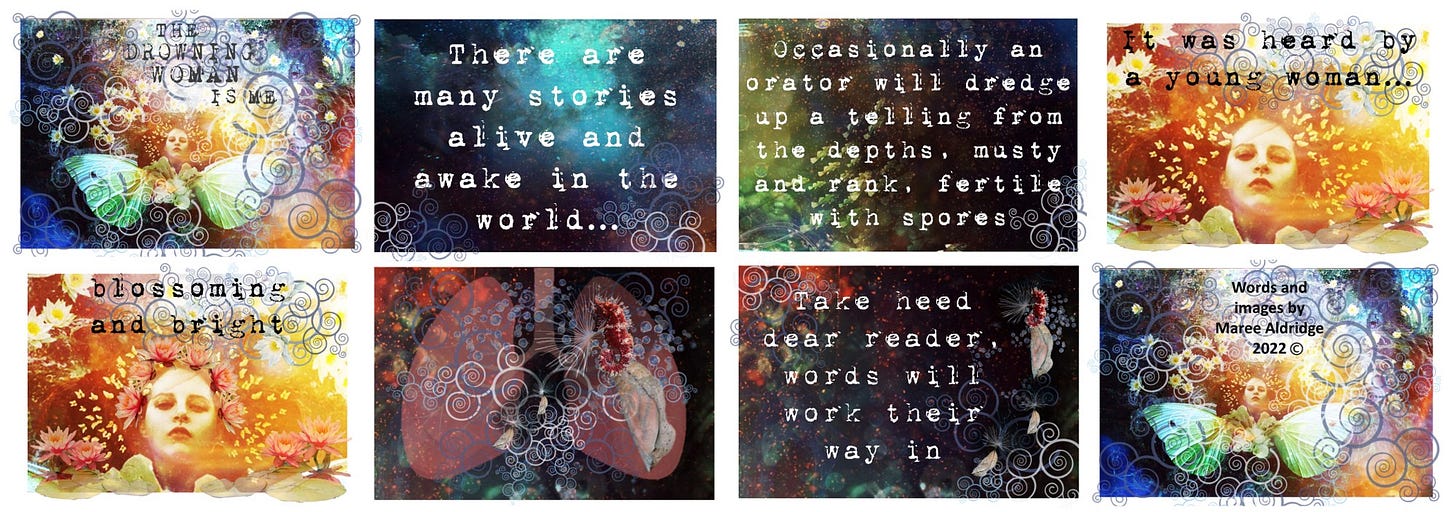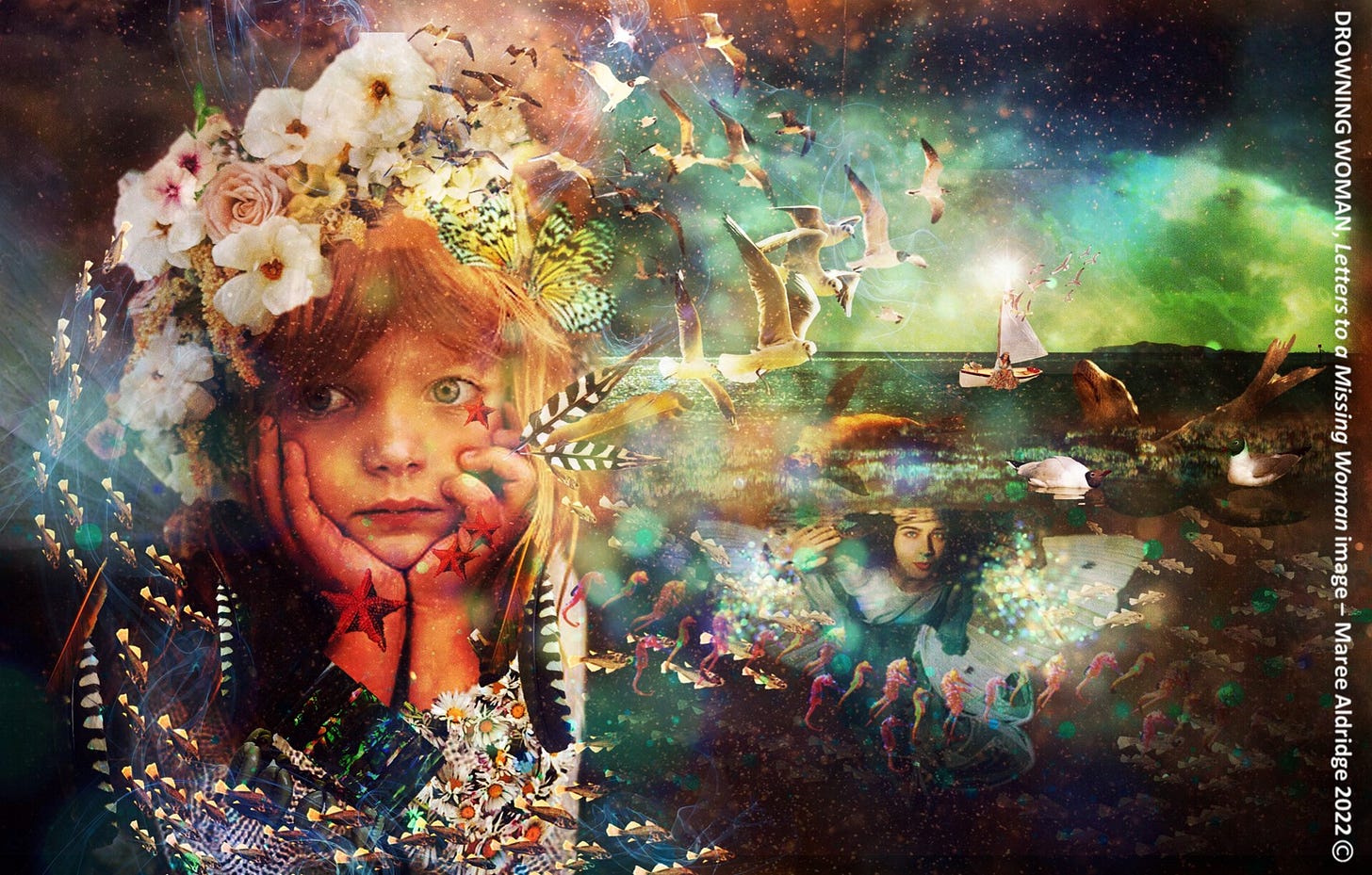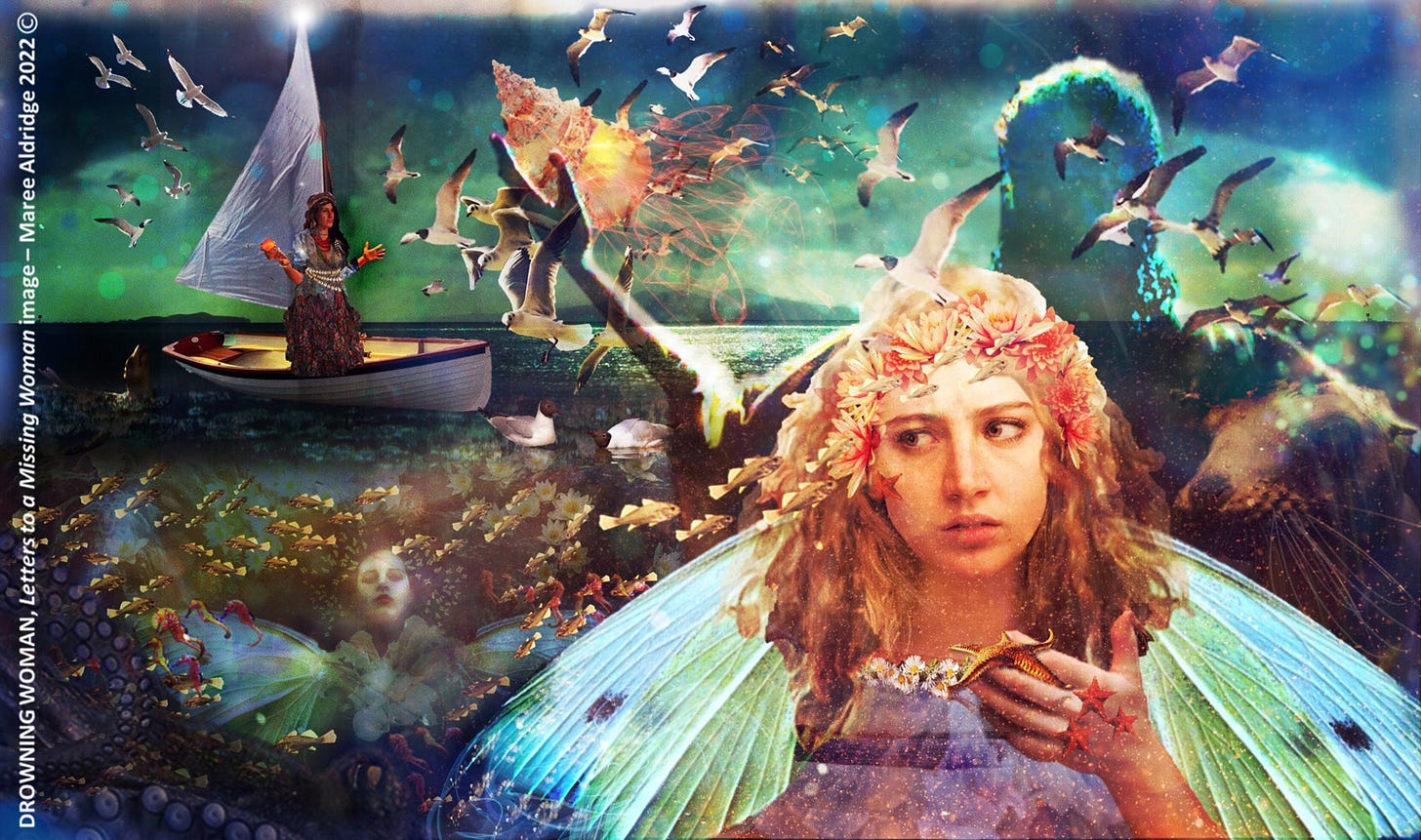A year of the "Drowning Woman" poem project
PART THREE - "Words will work their way in..." who is narrating this story?
July the 18th 2022 I posted on Substack part of the 'Introduction' to a new story, a branch of what I started to coin, 'the Drowning Woman poem project.' The introduction was titled "WORDS WILL WORK THEIR WAY IN..." (you can read it here https://maree.substack.com/p/words-will-work-their-way-in and listen to it being read it in the video below).
"Occasionally an orator will dredge up a telling from the depths, musty and rank, fertile with spores. ‘Drowning Woman’ was one of those stories. It was heard by a young woman at a time when her life was blossoming and bright. It confused, offended, and frightened her, as well as plenty of other listeners on the night it was told. She dismissed it as an absurd tale, and she squared her shoulders and stiffened her backbone, determined to forget and be happy, to go forth and live her blessed life. Yet, you cannot hear such a story without inhaling a few of those uberous spores. They settled into the airways of her lungs and lay dormant, undetected for years. Take heed dear reader, words will work their way in and who knows where they will lodge and what they will do."
Prior to publishing the introduction I'd been sketching out a few chapters about an adult woman who was thrown overboard into the ocean, presumably drowning, as she descends deeper and deeper under the waves. It became clear to me after a few sketchy chapters that I couldn't just write about a woman drowning, it needed more context and content to make it an interesting tale. I decided it was best to pause and ask, "What is this character's backstory?" There was a voice inside of me that answered, 'Thank you, I've got it from here, please write this down.' I scrolled to the end of my document and typed in a heading - "BLOSSOM THE BRIGHT TOLD BY THE NARRATOR." The sub-heading was, "Here's the story of Blossom the Bright before she meets with the Hag."
'The Narrator' told me the story and I wrote six pages about Blossom; what kind of child she was, that she was a 'foundling' and her protective foster parents were kindly indulgent, she was creative and a free spirit, her wary neighbours called her *“Faie,” and she had been scared out of her wits by a story she'd heard one night when she was on the cusp of womanhood. This event caused a major shift in her identity and circumstances. 'The Narrator' kept filling in Blossom's childhood/youthful stages of life in one overview. Then I had to decide what to do with it. It seemed best to carefully separate it into threads and weave it throughout the chapters as memories and a revealing of the the narrator's (or the storyteller's) inside knowledge of the tale.
* FAIE: Magical, enchanted, or otherworldly; fey or fae (Middle English - around 12th century)
By the by, I do not know the identity of the storyteller, but I'm beginning to suspect it could be one of the characters. Time will tell! After writing a brief her-story for Blossom, I had the narrator's voice clear in my mind. She was a mixture of compassionate frankness, sagacity, and tease. She'd lived and seen it all. Her voice lured and reassured me deeper into the murky unknown waters of the story, daring me to explore the darker shadows. It was a voice that said challenging things like, "Beware, dear reader, it is true that the best healers will not save you from suffering. If relief is what you seek look elsewhere.”
The introduction flowed nicely as I wrote it, and I could feel the impetus of the story filling in all the narrative cracks I'd left up until that point. Within days of scribing what the narrator had outlined, I asked the character 'Blossom' if she wanted to say anything on her own behalf about this tale. When I look back with fresh eyes today at what I wrote about a year ago, and haven't looked at since, it seems that Blossom was giving me the final word on the story, a brief epilogue. I remember thinking when I first wrote it down, 'That's interesting, what does she mean by that?' At the time I thought it best not to push the point, not to force the narrative in that direction or focus on that ending as a target to aim for. So, I let whatever she meant to remain a riddle. I've not referred back to it while writing chapters. Now that I'm over the halfway mark, heading towards the last quarter of the story, the narrative seems to be bending towards what Blossom had said about herself. Maybe her words were like spores that lodged in my lungs and have secretly been guiding me with each breath. I can see the ending as she breathed it gossamer-thin onto the page as a possibility, but I'm still not sure of what lies between here and there. I hold the threads of the various storylines lightly and weave as carefully as I know how to. What this weaving will make is still somewhat a mystery.
I finished reading Cornelia Funke’s 1132 page Inkheart Trilogy in May this year. It is a story about stories, the creative world-making narrative power of the both the written and spoken word, authors who seek control, readers who bring stories to literal life, characters who defy their designated plot lines, and ones that are called into tales that they do not belong to and find themselves acting out scripts written for them. Funke threads through her tales an understanding of the nature of creating stories and how stories can take on a life of their own both to confine and liberate us.
“All good stories hide behind a tangle of questions to be answered, and it isn’t easy to find out their dodges. And this story certainly has a mind of its own, but if you ask the right questions it will whisper all its secrets to you. A story like this is a very talkative thing.” Cornelia Funke - (in the voice of ‘Fenoglio’) Inkdeath
I am trying throughout this writing process to ask the right questions. But what are the right ones to ask? I think when I ask dud questions, I don't get any feedback. I'm left with creative silence. When I ask the so-called 'right' questions, usually in the form of an open ended inquiry, the story becomes very 'talkative.'
To partner with creativity is to partner with uncertainty. I read a quote recently that resonated about this reality. "Like a fog we must pass through, there's a length of confusion that proceeds originality. I think of this fog as initiatory in nature, turning back those who can't withstand the uneasiness of not being able to see the horizon. But anyone who has passed through bewilderment enough times knows that the fog is really a sacred shroud, giving us refuge from the outside world so we can finally turn towards ourselves." Toko-pa Turner
In turning towards my characters with friendly curiosity, I am turning towards the unknown and untold in myself. Or at least I am turning towards the capacity to endure bewilderment, to lose sight of the shore or the horizon, and to hold space for the unknown/untold to reveal itself in its own time. It has seemed that in working with the voice of the 'Narrator' I've had to trust her if she presented me with fog, confusing/carrot dangling phrases, or being pushed back in a warning to not get ahead of myself in the narrative. I had a friend recently who commented that my relationship to the creative process was one of 'fidelity.' It brings to mind what American poet Mary Oliver wrote about the subject, "Of this there can be no question — creative work requires a loyalty as complete as the loyalty of water to the force of gravity. A person trudging through the wilderness of creation who does not know this — who does not swallow this — is lost. [They] who [do] not crave that roofless place eternity should stay at home."
I think loyalty extends two ways; it's my commitment to pursuing and completing a creative project to the best of my ability, and I feel it's also knowing I'm part of a creative team (a cast of characters, storytellers, creative pixies, inspired ideas, synchronistic creative breadcrumbs, evolving images/visual language) who are loyally working with me. We take care of each other, and to me that is what fidelity means. It can feel like being pulled as a river toward a large sea, or to stand shelter-less and surrendered under an infinite sky. But I do not feel helpless because I know that respect for both gravity pulling me seaward and the infinite starry expanse are important dynamics in the creative process, and these forces work change in me during the act of creating.
'The Narrator,' whoever she is, feels like a skilled helmswoman riding the gravity-born swell, guiding the story, and my writing of it, to where it needs to go. She presents Blossom with a dark tale that gets under her youthful skin, its spores root in her lungs. Blossom is driven out from where she'd been hidden, as an invitation to deepen, and to bring her true forgotten life full circle (life-death-life). Piece by piece the narrator reveals more of what that true forgotten life is. She's like an archeologist working her way through a dig crossing multiple timescales, naming the broken fragments/storylines (Blossom, Neve, the Hag, Lady Death), and placing them where they need to go (not necessarily in order though). She's also like an alchemist, dissolving what became solidified (what I thought the 'Drowning Woman' poem meant), and is in the process of reconstituting the elements (the lines of prose, the imagery, the energy of descent and ascent) into a new form. The parallel process for me in writing and character/archetypal work makes me aware that whatever is happening to Blossom or the other characters is also happening inside of me on some level too.
I don't know who the 'Narrator' is yet, but I am looking forward to meeting her one day. For now I'm all out at sea with her, under the waves, over them in the Hag’s boat, standing on shores, swimming like a seal, sometimes in a strange croft on a far flung island, inside of dreams, and at the portals between times and lives.
I'll finish this reflection with a Rachel Carson* quote which is akin to the nature of creativity as I experience it especially in this story, “On all these shores there are echoes of past and future: of the flow of time, obliterating yet containing all that has gone before; of the sea’s eternal rhythms — the tides, the beat of surf, the pressing rivers of the currents — shaping, changing, dominating; of the stream of life, flowing as inexorably as any ocean current, from past to unknown future."
*(1907-1964, American marine biologist, writer, and conservationist who wrote an influential book Silent Spring which advanced the global environmental movement).






